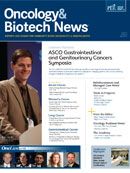Publication
Article
Oncology & Biotech News
Trial Affirms Survival Benefit of Novel Antiandrogen Signaling Agent MDV3100 in Advanced Prostate Cancer
Author(s):
The investigational agent MDV3100 extended survival in men with late-stage castration-resistant prostate cancer in the phase III AFFIRM trial.
Howard I. Scher, MD
The investigational agent MDV3100 extended survival in men with late-stage castration-resistant prostate cancer (CRPC) in the phase III AFFIRM trial. Moreover, the side-effect profile of this new drug was as good as that of placebo, for the most part. Objective experts not involved in the study were enthusiastic about this potential new drug to be used in the post-docetaxel “space.”
“The benefit-risk profile will likely position MDV3100 as the front-line agent for postdocetaxel therapy,” stated lead investigator Howard I. Scher, MD, chief of the Genitourinary Oncology Service at Memorial Sloan-Kettering Cancer Center, New York City. Scher presented these results at the ASCO 2012 Genitourinary Cancers Symposium.
Scher pointed out that MDV3100 works differently from other agents for metastatic CRPC. “The drug targets the androgen receptor and blocks a biological mechanism that enables tumors to resist other therapies and proliferate, and it worked far better than we expected when we started out,” he said.
AFFIRM randomized 1199 patients with progressive CRPC who failed docetaxel chemotherapy in a 2:1 ratio to either oral MDV3100 160 mg/day or placebo. All men had cancers that progressed on previous hormonal therapy and docetaxel.
The estimated median overall survival (OS) was 18.4 months in the MDV3100 arm versus 13.6 months in the placebo arm (P <.0001). MDV3100 significantly prolonged survival by an average of 4.8 months and reduced the risk of death by 37% compared with placebo. That led to early stopping of the trial, and placebotreated patients were allowed to cross over to receive MDV3100.
Median radiographic progression-free survival (PFS) was 8.3 months for MDV3100 versus 2.9 months for placebo (P <.0001), showing that MDV3100 significantly slowed the progression of bone metastasis, a devastating complication for patients.
A significantly higher proportion of patients treated with MDV3100 showed tumor shrinkage on imaging (30% of patients had complete or partial responses to MDV3100 on imaging vs 1.3% of the placebo group; P <.0001)) and also had at least a 50% or greater decline in prostate-specific antigen (PSA) level (54% of MDV3100-treated patients vs 1.5% of placebo patients; P <.0001).
“These favorable changes [in imaging and PSA] are consistent with the survival benefit observed,” Scher said.
MDV3100 had a similar adverse-event profile to that of placebo; in fact, more patients had serious adverse events in the placebo arm (38.6%) than in the MDV3100 arm (33.5%). More grade 3 or higher adverse events were also reported in the placebo arm than in the MDV3100 arm (53.1% vs 45.3%, respectively).
Commenting on this study during an official presscast, Nicholas J. Vogelzang, MD, had one word: “Wow!” Vogelzang is chair and medical director of the Developmental Therapeutics Committee at US Oncology Research, Las Vegas, Nevada.
Vogelzang said he sees no hurdles to FDA approval for MDV3100. He commented that MDV3100 and another new drug seeking FDA approval, radium-223, both extended survival in metastatic CRPC and have distinct mechanisms of action. It is likely that these drugs will be studied in the future in combination or sequentially to further boost survival.
David Hung, MD, president and CEO of Medivation, Inc, developer of MDV3100, had this to say: “This is the first in class of investigational androgen receptor signaling inhibitors. We are in the process of preparing submission to the FDA, and have received fast track designation from the FDA.”
“I think prostate cancer is still a large unmet need. We are very excited about these results of the AFFIRM trial. The survival benefits seen with this drug combined with its overall profile will make it an attractive option for patients with CRPC. We are delighted to provide patients and physicians with yet another option that improves survival,” said Hung.


































%20(2)%201-Recovered-Recovered-Recovered-Recovered-Recovered-Recovered-Recovered-Recovered-Recovered-Recovered-Recovered-Recovered-Recovered-Recovered-Recovered-Recovered-Recovered.jpg?fit=crop&auto=format)
%20(2)%201-Recovered-Recovered-Recovered-Recovered-Recovered-Recovered-Recovered-Recovered-Recovered-Recovered-Recovered-Recovered-Recovered-Recovered-Recovered-Recovered-Recovered.jpg?fit=crop&auto=format)
